London, UK, 16th June 2020 — Detego has installed its cloud-hosted RFID (Radio Frequency Identification) SaaS platform in Marc Cain’s new state-of-the-art Distribution Centre (DC). Detego delivered the solution alongside KNAPP, who led the overall development of the new centralised operation. The highly-automated Distribution Centre, based in Germany, uses RFID tunnels to verify inbound and outbound shipments without needing to open any boxes. The implementation of RFID in the Distribution Centre allows for over 35,000 articles to be processed on a daily basis, with 100% accuracy and significant improvement to efficiency and visibility of the supply chain.
Marc Cain is a worldwide premium brand for women’s fashion, operating predominantly out of Germany. After continued growth, the brand opted to move away from their regional warehouses to develop and construct a highly-sophisticated singular DC which boasts over 24,500m2 of usable area. Marc Cain’s logistics and solutions partner, KNAPP, brought in RFID specialists, Detego, to integrate the necessary RFID systems with their leading KiSoft WMS & WCS software. Doing so allows for automated item-level tracking of products both entering and leaving the Distribution Centre. These advancements have enabled Marc Cain to cope with their increased demand whilst ensuring complete accuracy and timely shipping of all orders.
“As we had already experienced good cooperation in another project with Detego, we have reached out to them when we started discussing the RFID request Marc Cain was looking for. Within a short time, we were able to integrate the state-of-the art platform from Detego in the solution we were providing to Marc Cain. With that extension, we can support Marc Cain to increase the efficiency and reliability inside the warehouse and have 100% content checks for every delivery leaving the warehouse”, Stefan Leichtenmueller – Customer Care Manager.
RFID is frequently being adopted in Apparel retailers’ Distribution Centres, as the speed at which it can process shipments at item-level is unmatched. Detego has a strong pedigree of deploying RFID solutions in the supply chain, being the first to develop an end-to-end software platform for retail. This experience, alongside their focus on the apparel retail sector, makes their advanced RFID platform a perfect match for KNAPPs leading warehouse automation systems and software for e-commerce, retail, and fashion. The decision to use RFID was made even more attractive by the fact Marc Cain have already adopted RFID-driven processes in stores, allowing them to gain additional value out of their digital garments within the supply chain.
“With this solution, Marc Cain can perform automated inbound and outbound RFID validation, ensuring complete accuracy going in and out of the Distribution Centre,” stated Urs Konstantin Rouette, Managing Director Technical Development, Production, Purchase & Logistics. Staff simply place cartons on a conveyor and the boxes are taken through an RFID tunnel which counts and validates every individual garment inside the box, without needing a line of sight. All information is stored in the cloud-hosted Detego platform providing complete visibility over items entering and leaving the DC. Any cartons with discrepancies are automatically diverted to exception handling lanes where they are double-checked with High-Density Read Chambers (HDRCs) and subsequently corrected.
KNAPP also share additional customers with Detego and is one of many 3rd party logistics providers that Detego has recently partnered with to integrate their RFID platform. As the demand for visibility and operational efficiencies in the supply chain increase, more retailers are seeking RFID systems to complement their existing technology stacks from factory, to distribution centre and throughout store networks.
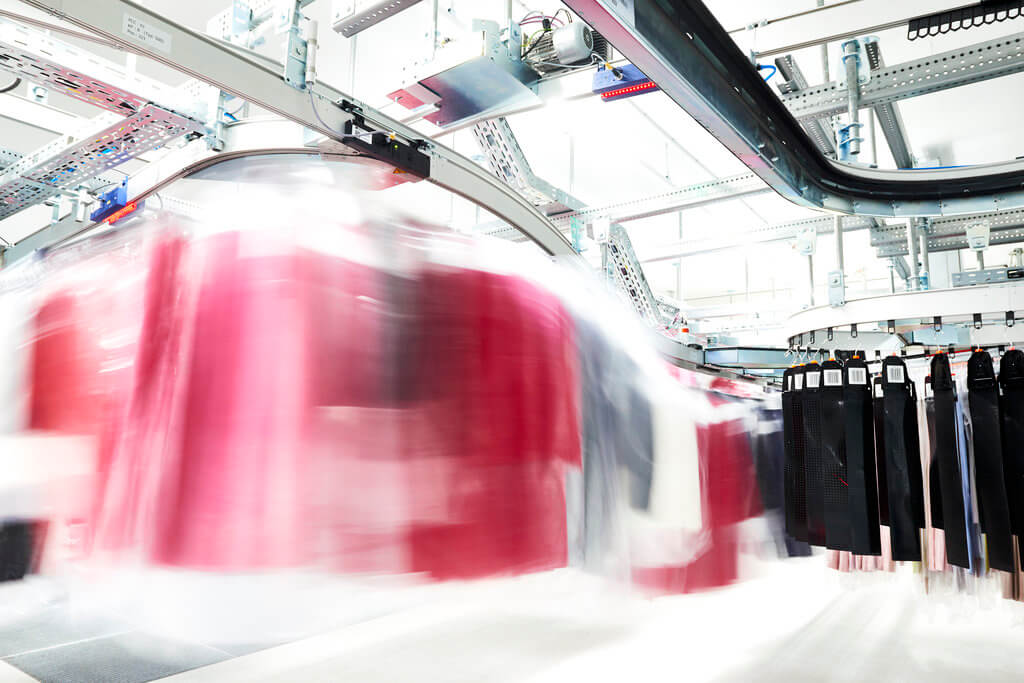
About Detego
Detego, founded in 2011 with offices in the UK, Austria and Russia, is the only global RFID provider focussing solely on software for retail. Detego has developed the most comprehensive end-to-end SaaS-based RFID platform on the market, delivering operational efficiencies and revenue uplift across the value-chain, including factories, distribution centres and retail store networks. Detego provides its retail customers with fast ROI through improved stock accuracy, product availability and better decision making gained from the powerful item-level data, combined with its comprehensive reporting and Artificial Intelligence capabilities. Detego’s software is complemented by managed services and attractive financing models. Detego‘s customers include international fashion brands, retailers and department stores. Detego is already being used in over 2,000 stores and 15 distribution centres. More information can be found at www.detego.com
Press contact:
Detego Ltd
10-11 Park Place
London, SW1A 1LP
United Kingdom
Luke Sinclair – Marketing
Tel: +44 (0) 7464 207099
l.sinclair@detego.com
Apparel Retail’s New Normal: COVID-19 Impact and Future Trends
16th June 4 pm BST / 11 am EDT
As apparel retail begins to get back to its feet, how are retailers preparing in the short-term, and what lasting effects will there be? The pandemic will cause the rapid acceleration of ongoing changes in the industry, and entirely new ones that could never have been expected.
Now stores are facing new social distancing guidelines, the formula for customer experience has changed. With reduced foot traffic and higher levels of eCommerce, the digital evolution of the retail store is now or never. Join us on the 16th of June as we dive into the physical and digital transformations behind retail’s ‘new normal’.
This webinar will cover:
- The impact of the COVID-19 crisis on the apparel retail industry
- How retailers are adapting retail stores to social distancing measures
- How a shift in the balance between eCommerce and brick-and-mortar is driving retailers to adopt digital-enabled stores
- How retailers can utilise digital and analytics to optimise operations and solve key challenges
London, UK, 01 June 2020 — Detego, an industry leader in RFID software solutions for retailers, has taken a major step to expand into the North American market. The cloud-hosted SaaS platform provider has more than 500 live installations of its software in the US, including both stores and distribution centers. Detego is now growing its US presence with the recruitment of Umesh Cooduvalli as Vice President of Sales for the US. Umesh has previously led many successful RFID projects in the retail sector and brings both specific market knowledge and a deep understanding of the technology and solution sales.
Kim Berknov, Executive Chairman of Detego announced “the group is extremely proud to be working with some of the largest retail accounts in fashion and sportswear, many of which we have successfully deployed across the US. This has allowed us to gain unique insights into the challenges retailers face and utilise these learnings within our solutions. Now more than ever, retailers need to think smarter and more efficiently to ensure business continuity. Detego is confident we have developed the necessary solutions to meet the old and new challenges facing retailer’s supply chains and stores.”
“With strong partnerships and large-scale RFID deployments already existing across the country, the addition of a USA based team is a logical next step. Umesh Cooduvalli brings years of experience in the retail RFID industry and will be able to offer both his and Detego’s years of expertise to US retailers looking to digitize their operations.”
Newly appointed Umesh Cooduvalli, commented “Detego has been leading innovation for RFID in retail for a number of years. I am proud to now be a part of the team bringing their world-class solutions into the US market to ensure the sustainable success of retail.”
About Detego
Detego, founded in 2011 with offices in the UK, Austria and Russia, is the only global RFID provider focussing solely on software for retail. Detego has developed the most comprehensive end-to-end SaaS-based RFID platform on the market, delivering operational efficiencies and revenue uplift across the value-chain, including factories, distribution centres and retail store networks. Detego provides its retail customers with fast ROI through improved stock accuracy, product availability and better decision making gained from the powerful item-level data, combined with its comprehensive reporting and Artificial Intelligence capabilities. Detego’s software is complemented by managed services and attractive financing models. Detego‘s customers include international fashion brands, retailers and department stores. Detego is already being used in over 1,750 stores and 15 distribution centres. More information can be found at www.detego.com
For more information:
Kim Berknov – Executive Chairman
k.berknov@detego.com
Press contact:
Detego Ltd
10-11 Park Place
London, SW1A 1LP
United Kingdom
Luke Sinclair – Marketing
Tel: +44 (0) 7464 207099
l.sinclair@detego.com
Data by nature: Why eCommerce analytics are steps ahead
Online retailing not only created a new way of shopping, but it also changed the game when it comes to tracking and analysing the shopping journey. There is almost nothing that is not being evaluated while surfing the webshop. Digital-heat-maps of individual online sessions are analysed, showing every click and scroll through the online store. Every possible KPI is monitored: Conversion rate, click-through rate, average order value, the relation between new and returning visitors, bounce rate and retention to name a few. The really powerful thing about this is that analysis is always followed by action, to improve both the effectiveness of the webshop and the experience of its customers.
Data by design? Time for brick and mortar to take some lessons
Naturally, eCommerce has a significant advantage when it comes to analytics, a digital channel is always going to produce more data. Brick-and-mortar stores need to adapt to compete however, and technology is trying to bridge this gap between the physical and digital. Some of the more hardware-heavy options include AI-powered cameras, smart shelves or even aisle-roaming robots.
While hardware-intensive solutions like customer-tracking smart cameras are available, with the right software supporting it, a technology that simply tracks products (such as RFID) and leverages the IoT (Internet of Things) can revolutionise analytics for stores. These technologies and their supporting platforms are a big driver of ‘Digital transformation’ which delivers the analytics and data that brick-and-mortar stores are desperate for.
Here are 3 lessons from eCommerce for improving analytics in retail stores….
The need for real-time data
For years, brick-and-mortar retailers have been complaining about imprecise stock-figures and unreliable historical data. Unhappy with its purchasing decisions based on last year’s sales figures, retailers would prefer to have real-time data and inventories that allow for reliable and economically viable decisions. After all, it is important to avoid high-security stocks in order to reduce capital tie-up.
But why do we actually have this problem? Are the data points offered by the ERP systems not enough? Unfortunately not – it is not unusual that the ERP system shows higher stock than actually available on the sales floor. This so-called “ghost stock” is the cause for various problems in sales, e.g. the ERP system says a certain article, for example, a red skirt in size S, is in stock, but in reality, it is not. It can neither be sold nor refilled from the central warehouse – a classical out-of-stock situation. Or vice-versa, the ERP displays a lower inventory level than is actually available. The reason for these deviations is insufficient accuracy in individual processes that dangerously sum up over time.
Today’s intelligent article management is based on three pillars: fast, RFID-based article identification on item-level, tracking of every movement in real-time and proactive analysis with concrete recommendations for actions to take for the sales personnel. This is the foundation for optimum customer service and efficient processes.
What does real-time data mean for Brick and Mortar Stores?
- High Stock accuracy
- Increases product availability of the shop floor from accurate replenishment
- Allows for convenient omnichannel services like click-and-collect
- Equips store staff with up-to-the-minute stock information – allowing them to assist customers better
Meaningful KPIs in the store
When measuring KPIs, the practical benefits for retailers are paramount. Three areas of data in the store can be distinguished:
KPIs for Store performance
Inventory Accuracy
Whether five or 800 stores, KPIs for measuring inventory accuracy are significant for every retailer and still represent one of the main challenges in today’s business. Retailers, on average, can actually make accurate statements on just about 75% of their inventory (based on SKU level). However, this is not enough to meet customers’ expectations for omnichannel services. Therefore, inventory transparency and corresponding KPIs are essential for retailers´ success.
Product availability
Product availability on the sales floor, also known as on-floor availability, is the second central parameter. Initially, it is less about the exact position and more about the fact that the articles are on the sales floor – after all, only items that are actually available can be sold. This key figure can be combined with an alert system that makes sure not to fall short of the defined minimum availability. Complementary to classical ERP-systems, RFID-based merchandise management takes the data granularity to the next level, by knowing exactly at each moment in time if products are really on the salesfloor or still lingering in the backroom of a store.
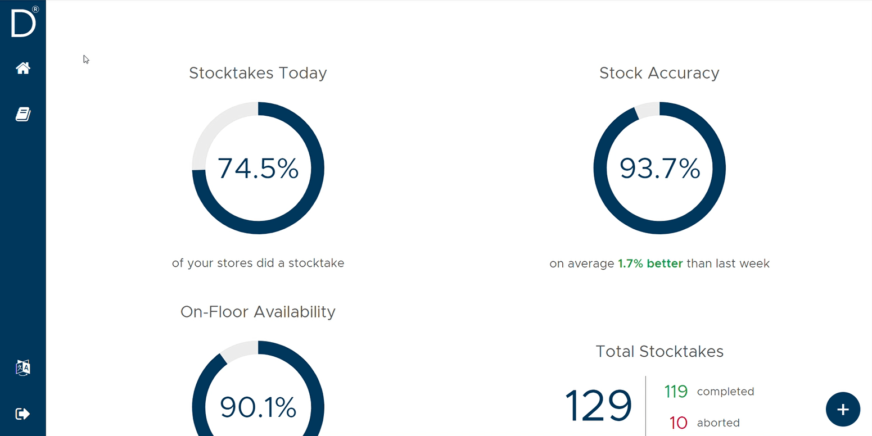
KPIs for individual product & campaign performance
Product dwell-time on salesfloor
Having data on item level, store managers are also given important information on the dwell times of articles on the sales floor. This information is more valuable than simple sales data, as it tells us the average time individual products spend on the sales floor before being sold. This can be used to gauge whether products are performing & corresponding with the sales plan. Common recommendations made from this data include moving items do a different location on the salesfloor (i.e. adjusting the planogram) or relocating excess inventory to another store – both of these measures reduce profit-sapping inventory bloat and end-of-season markdowns.
Fitting room conversion rate
One of the most famous KPIs in e-commerce is the conversion rate that describes the ratio between purchases and website visitors and also provides information on certain items that were already in the shopping cart, but for some reason have not been purchased in the end. Specifically, this aspect was incredibly difficult to measure in the store for a long time but can now be measured in fitting rooms using IoT and RFID technologies. This provides meaningful insights into how many, and above all, which articles does a customer take into the fitting room and which one does she/he actually buy?
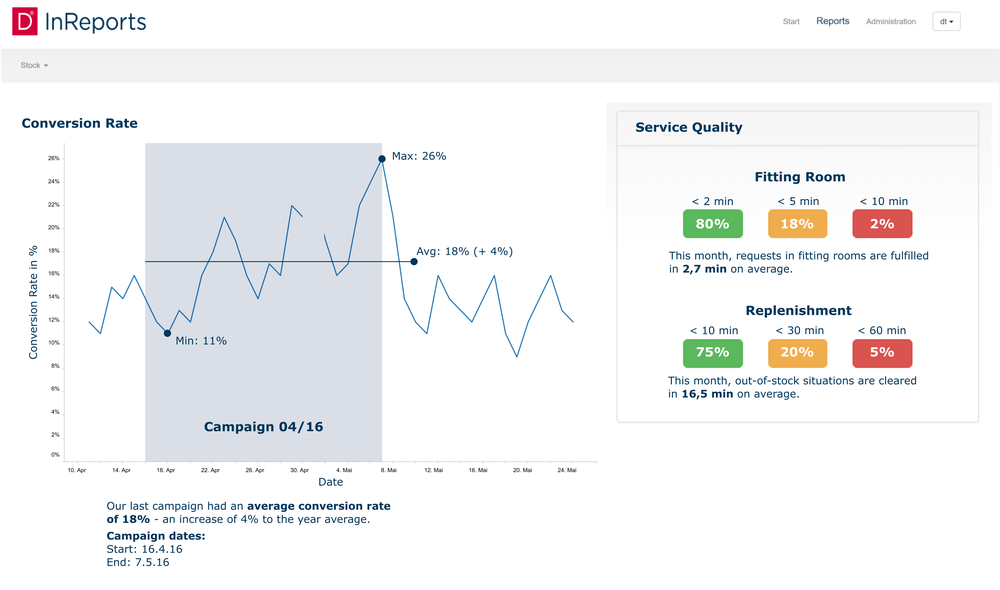
KPIs on customer engagement and service quality
On an operational side, KPIs can also be used to manage service quality. We’ve already covered product-availability and stock accuracy, which affect the customer just as much as the store with out-of-stocks or unavailable sizes being all-too-common pain points. The replenishment rate provides another angle to combat this, as it shows how quickly articles are replenished on the sales floor. On the other hand, the fitting room response time describes how quickly sales personnel handle customer requests coming from the fitting room. The KPI “Conversion rate per campaign” shows the success of a campaign and if campaign-specific countermeasures are necessary.
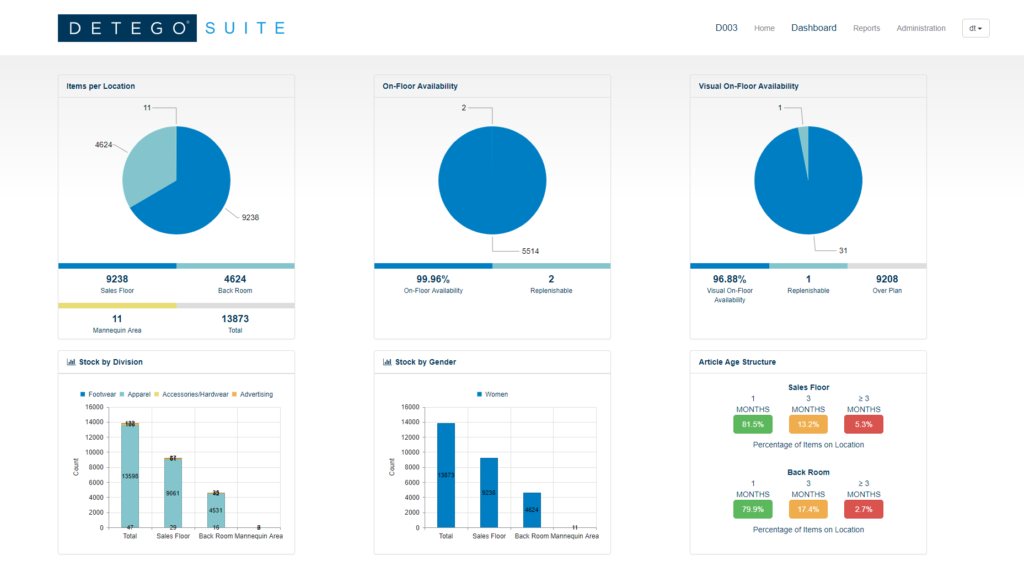
Turning data into actions
The final lesson brick-and-mortar retail should learn from the webshop? Turning data into actions. Since nobody needs a data graveyard, any analysis needs the goal of creating immediate actions to improve. Today’s systems help the management team as well as the store personnel with concrete and automated recommendations for actions to take. This saves time in the decision-making process, unburdens the sales personnel, and enables them to do the right things at the right time.
KPIs should be suitable for everyday business use. Presented visually and self-explanatory, they need to be linked to clear recommendations for actions to take. This frees up store personnel time and provides a data-driven way of optimization. Examples range from simple in-store replenishment advice, i.e. “The minimum stock for article #47699-0010 has been reached – please refill three pieces” to more advanced topics, e.g. to choose a different placement in the store for a specific article when the dwell time on the sales floor is too high compared to other stores. Advanced systems can even utilise AI and Machine learning to automate and refine certain processes, like adjusting store planograms and creating optimal pick paths when replenishing stock.
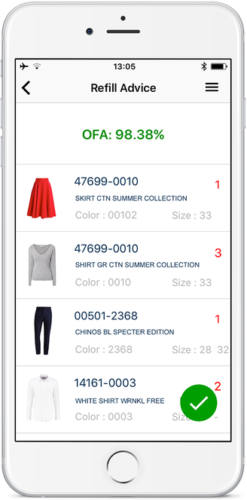
Conclusion
Brick-and-mortar retail needs support and an update to the toolbox when it comes to analysis and measures. Not only does the sales personnel benefit from intelligent recommendations for action, but the management team also gains efficient control mechanisms across the entire store network. Decisions are made based on real-time data and therefore allow timely action. Ultimately, the end customer is pleased about a first-class service, which – thanks to the individual and informed advice through the sales personnel – even exceeds the standards of the online retail.
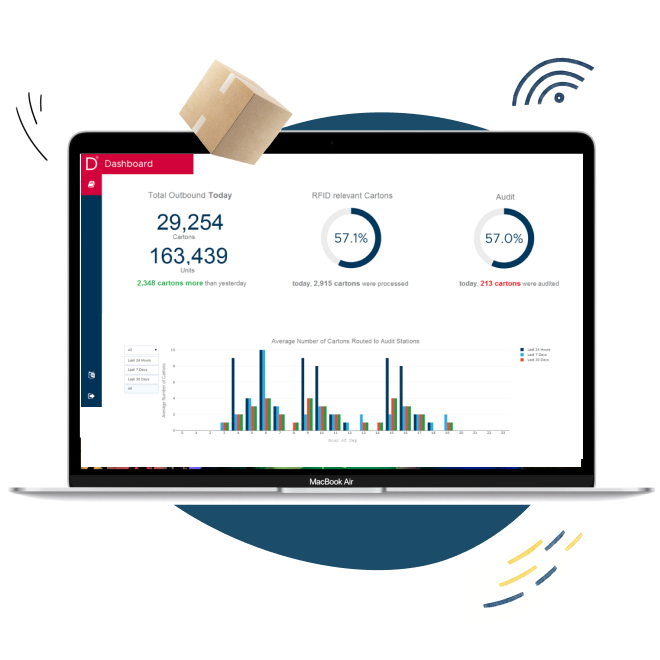
Webinar
Item-level Reporting from
Source-to-Store
Register for this webinar where we outline the impact of digitisation on supply chain analytics and operational efficiency. Covering the wealth of item-level data unlocked by RFID, the presentation will explain the new KPI’s available for modern supply chains and their impact on retail operations.
Webinar: Item-level reporting from source-to store
Digitisation and data go hand-in-hand. As retail supply chains continue to go digital, a wealth of item-level data on the flow of merchandise through the supply chain is unlocked. In the future, the winners and losers of supply chain management will be determined by who leverages this information more effectively.
Join Detego’s Chief Data Scientist, Simon Walk, as he presents the cutting edge of supply chain analytics and how digitisation is taking the guesswork out of retail logistics.
This webinar covers:
• Item-level tracking of Items along the Supply Chain to deliver accountability, visibility & traceability
• Effective traceability which combats supply chain shrinkage and counterfeit products.
• Using heuristic & Machine Learning based Algorithms to detect supply chain irregularities.
• Using dwell-time data to optimise operational & Supply Chain processes
• Analysing throughput data across factories, DCs and stores
Webinar Recording: Best Practice RFID for Retail Supply Chains
Retail has evolved dramatically in recent years, driven by changing customer expectations, online disruption, and the ongoing digitisation of the industry. Whilst many stores are embracing technology to wow customers and deliver seamless experiences across multiple channels, behind the scenes supply chains are evolving too.
In this webinar we outline how Radio Frequency Identification (RFID) technology is strengthening supply chains and delivering the accuracy and transparency that modern retail demands. Covering the item-level journey from source to store, the presentation will explain how and why major retailers are choosing RFID to digitise and future-proof their supply chains.
This webinar covers:
- The business case and benefits which RFID technology can bring to the retail supply chain
- Key RFID processes and use cases in factories and distribution centres/warehouses
- Best-practice approach and strategy for implementing RFID across the supply chain
- Examples of successful customer implementations and learnings
- Critical insights to successfully manage new supply chain challenges during COVID-19 pandemic
London, UK, 20/04/2020 — Detego, a market leader for RFID software solutions for fashion & sports retailers, has announced their new factory solution which ensures that factory shipments are validated on an item-level to prevent shipping errors and provide complete traceability throughout the supply chain. The cloud-hosted solution is part of Detego’s end-to-end RFID software platform which also includes leading products to manage warehouses, stores, smart displays and AI-powered analytics.
Detego developed the solution based on the growing demand for item-level inventory visibility throughout the supply chain, as more retailers continue to adopt RFID technology at the heart of their operations. Detego’s proven success with deployments of RFID software within fashion and sportswear retail stores and distribution centres has naturally continued upstream to the factory where there is a strong business case for traceability and accuracy of shipments. The factory solution provides retailers with the ability to track individual products from source-to-store by verifying outbound carton shipments, helping to prevent shipping errors to distribution centres, reducing human mistakes and improving operational efficiencies.
“Retailers are now adopting RFID throughout their entire supply chain to realise the full potential of the technology, from the factory to the consumer. Detego’s factory solution helps to maximise operational efficiencies at the source whilst providing more visibility of inventory from the very beginning. We now find ourselves in the unique position of being able to offer the only proven end-to-end RFID platform on the market, from factory, to DC, to stores and even consumer engagement in the stores” says Kim Berknov, Executive Chairman of Detego.
The solution is delivered as a cloud-hosted mobile application which integrates directly with a range of RFID hardware as well as the factory’s ERP system. Detego offers the solution with different modules allowing for a range of processes to be performed in the factory, such as verifying shipment contents against target lists or verifying RFID tags have been encoded and printed correctly. These processes ensure 100% accuracy of shipments helping to prevent costly errors at source and provide more confidence in retailers supply chain operations to ultimately improve customer experience.
As the factory solution is part of the wider Detego platform, retailers will now be able to track every ‘read event’ relating to an individual item/EPC (Electronic Product Code), from the moment it leaves the factory all the way to being sold in the store. This will further help prevent shrinkage in the supply chain, whilst providing complete transparency of an individual item’s delivery time to distribution centres, stores or Direct-To-Consumers (DTC).
With factories in China now back in action, Detego’s new solution is perfect to ensure the visibility of these shipments are on time and accurate to prevent any further costs to retailers in these difficult times.
About Detego
Detego, a global retail software provider, was founded in 2011 and is headquartered in London, UK, with offices in Graz, Austria and Moscow, Russia. The company develops and delivers a cloud-hosted RFID platform that digitises your traditional stock management processes, making them more efficient and more accurate to prevent out-of-stock situations and ensure optimal product availability for retailers. The modular platform covers the entire value chain from the factory to the store, and even consumer engagement in the store. By doing so, retailers can unlock the power of RFID to provide customers with a consistently good shopping experience across all channels. Detego’s software is complimented by managed services and software-as-a-service (SaaS), along with attractive financing models. Detego‘s customers include international fashion brands, retailers and department stores. Detego is already being used in over 1,750 stores and 15 distribution centres. More information can be found at www.detego.com
Press contact:
Detego Ltd
10-11 Park Place
London, SW1A 1LP
United Kingdom
Luke Sinclair – Marketing
Tel: +44 (0) 7464 207099
l.sinclair@detego.com
London, UK, 25/03/2020 — Retail RFID software specialists, Detego, have announced a new solution to support retailers and help them maintain business continuity during the ongoing effects of COVID-19. The solution, available to retailers using RFID, will allow brands to adapt to the increased pressure on their DC / DTC operations as eCommerce becomes their primary sales channel. With it, retailers will be able to utilise efficient RFID processes to drastically increase the speed of handling returns directly from consumers back into their Distribution Centers.
Detego, who partners with several major fashion retail brands, aims to alleviate some of the pressure on retailers due to the COVID-19 epidemic by solidifying their eCommerce operations and returns process for increased demand. With retail sales down and brick-and-mortar stores being heavily affected by closures and social distancing measures, Detego is anticipating an unprecedented shift to online shopping. Whilst the majority of retailers run eCommerce operations alongside their physical stores, this is typically only around 10-15% of their overall retail sales. For omnichannel retailers, eCommerce has now become the primary sales channel for the foreseeable future. There is already early evidence of this, with preliminary data from Quantum Metric showing that eCommerce associated with Brick and Mortar retailers saw an average revenue weekly growth rate increase of 52%.
This sudden shift to eCommerce will pose significant challenges for many retail distribution centres, as supply chains and operational systems may struggle or even buckle under the increased pressure. The primary challenge that comes with increased online sales is the subsequent increase in returns. While shoppers return only 10% of what they buy in stores, they send back up to 50% of what they buy online. The major capacity concern will be in the increased rate of online orders and will most likely present bottlenecks and stockouts in the returns process.
“The new returns module (part of Detego’s end-to-end RFID platform) strengthens distribution centres by utilising fast and efficient inbound RFID reading of cartons/boxes to verify against a target list based on the returned item from the customer”, – mentioned Nikolay
Vakulich, Product Manager at Detego.
The SaaS-enabled solution integrates with all standard RFID hardware and WMS (Warehouse Management Systems) to count, verify, display, track and manage inventory moving from the DC/DTC to consumer or wholesaler as well as processing all returns back to the DC / DTC. Additional functionality will also allow retailers to use a ‘quality grading’ system and display product imagery to more effectively identify and sort inbound returns.
RFID-enabled retailers utilising the solution can achieve greater flexibility in ordering and fulfilment due to forecasting of incoming returns/shipments and up to 90% faster processing times. This not only prevents bottlenecks occurring in the supply chain due to unprocessed returns, but it ensures stock is made available as soon as possible upon being returned, reducing out-of-stocks on the webshop. This is in addition to 100% shipping accuracy and verifying the legitimacy of returns using unique digital identity provided by RFID tags.
About Detego
Detego, a global retail software provider, was founded in 2011 and is headquartered in London, UK, with offices in Graz, Austria and Moscow, Russia. The company develops and delivers a cloud-hosted RFID platform that digitises your traditional stock management processes, making them more efficient and more accurate to prevent out-of-stock situations and ensure optimal product availability for retailers. The modular platform covers the entire value chain from the factory to the store, and even consumer engagement in the store. By doing so, retailers can unlock the power of RFID to provide customers with a consistently good shopping experience across all channels. Detego’s software is complimented by managed services and software-as-a-service (SaaS), along with attractive financing models. Detego‘s customers include international fashion brands, retailers and department stores. Detego is already being used in over 1,750 stores and 15 distribution centres. More information can be found at www.detego.com
Press contact:
Detego Ltd
United Kingdom
Marketing
Tel: +44 (0) 7464 207099
marketing@detego.com
Sunday 15th March 2020
Dear colleagues and customers,
First and foremost, we hope this finds you well. The escalation of the COVID-19 global pandemic is concerning to us all, and our thoughts are with everyone who has been affected by this situation. It is a reminder that we have more than just a business relationship with our customers – we are indeed a shared community and a part of the same eco-system. At Detego we are doing all we can to support our customers and keep all of our people and their families safe from harm.
We have been monitoring this rapidly evolving situation closely, and we are in constant dialogue about how best to balance the safety and health of our employees/consultants while maintaining the continuity and quality of ongoing operation, service delivery and support that we are entrusted by our customers.
We are fully equipped to provide uninterrupted service to all our customers in a remote working and operating environment. With that in mind, we would like to share with you some measures that we have taken that will ensure that we maintain the levels of service and responsiveness our customers expect from Detego, with the need to adapt to the circumstances in which we now find ourselves.
Following the guidance of various international and domestic public health bodies, we have instituted a number of measures to help minimize risks to our personnel and customers, including the enforced delay or cancellation of a range of trade events.
Various precautionary measures for our own staff now include:
- A restriction on non-essential business travel
- Shifting in-office arrangements to comply with recommended social distancing
- Increased frequency and scope of office cleaning
- Enhanced healthcare support for our employees
- Remote/ working from home policy including communication and productivity measurements
The company will continue to remain operational during this rapidly evolving situation and we are committed to providing ongoing excellent customer service.
We hope you stay healthy during the coming weeks. If you have any questions or concerns, please do not hesitate to contact us.
Thank you,
Nikolay Danilov Kim Berknov BrianRobertson
The retail environment has never been more demanding than it is today, thanks to fierce competition, the growth of e-commerce, and consumers’ high expectations for seamless shopping experiences. It’s a situation made even more difficult by a lack of inventory visibility, the complexity of supply chains and the sheer variety of products brands are faced with.
While retailers have access to a growing number of solutions to these issues, RFID (Radio Frequency Identification) is the only one that’s proven to consistently meet retailers’ needs for leaner processes, accurate inventory and real-time data analytics.
This webinar covers:
• The five most important needs identified by retailers and their effect on business
• How RFID-based systems and processes can be applied to solve each need
• What financial and operational benefits can be gained by doing so
• How retailers can further unlock the power of RFID to offer a truly seamless and connected shopping experience
